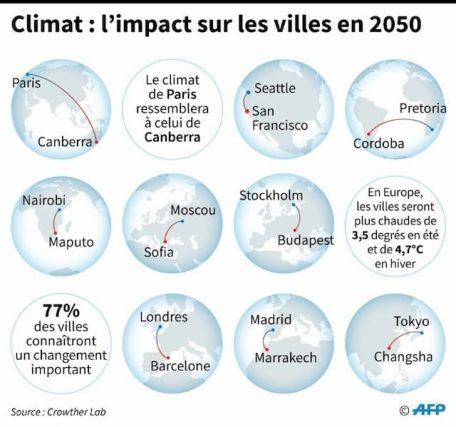In 2050, The Climate in Paris will be like in Canberra Today According to a Study

This analysis, published in the scientific journal PLOS ONE Wednesday 10th July 2019, is based on the most optimistic scenario of global warming.
In 2050, the climate in London will look like that of Madrid today. Stockholm will be like Budapest, and Paris like Canberra, according to an analysis published Wednesday 10th July 2019, which rests on the most optimistic scenario of warming.
The changes will be even more radical for the tropical regions, where the major cities of Kuala Lumpur, Jakarta and Singapore will suffer more and more extreme weather events, according to this study published by the scientific journal PLOS ONE and conducted by researchers from the ETH Zurich University.
They studied the climate of 520 major cities of the world, according to 19 variables including temperature and precipitation.
More droughts and rains at the equator
For these estimates, scientists have used deliberately optimistic models, that is, assuming that carbon dioxide emissions will stabilize by the middle of the century, so as to limit the rise in average temperature. globe at 1.4 ° C compared to the pre-industrial period (the world is at about + 1 ° C).
The team then compared the Paris, London, Stockholm … of the future to the current cities, with the aim of making the changes to come more tangible.
The cities of the northern hemisphere will resemble in 2050, in climatic terms, those of today that are 1000 km to the south.
Those at the equator will not undergo major warming but will have more droughts and rains.

The authors of the study concluded that 77% of cities in the world will see their climate change “strikingly”, while the rest will face “new” conditions.
Europe will have warmer summers and winters of 3.5 ° C and 4.7 ° C, respectively, on average.
One of the authors, Jean-François Bastin, is a Belgian national. He told AFP that it is not certain that by 2060 his country will still see mercury go below zero, a necessary condition for the activation of wheat seeds.
“The purpose of the article is to make everyone understand the consequences of climate change.”
Enjoyed this? Get the week’s top France stories
One email every Sunday. Unsubscribe anytime.


